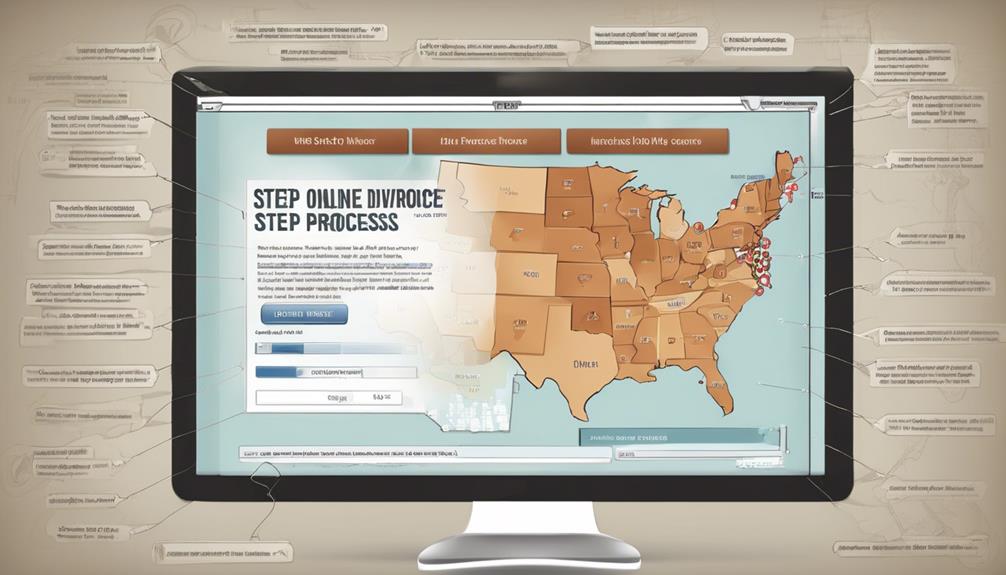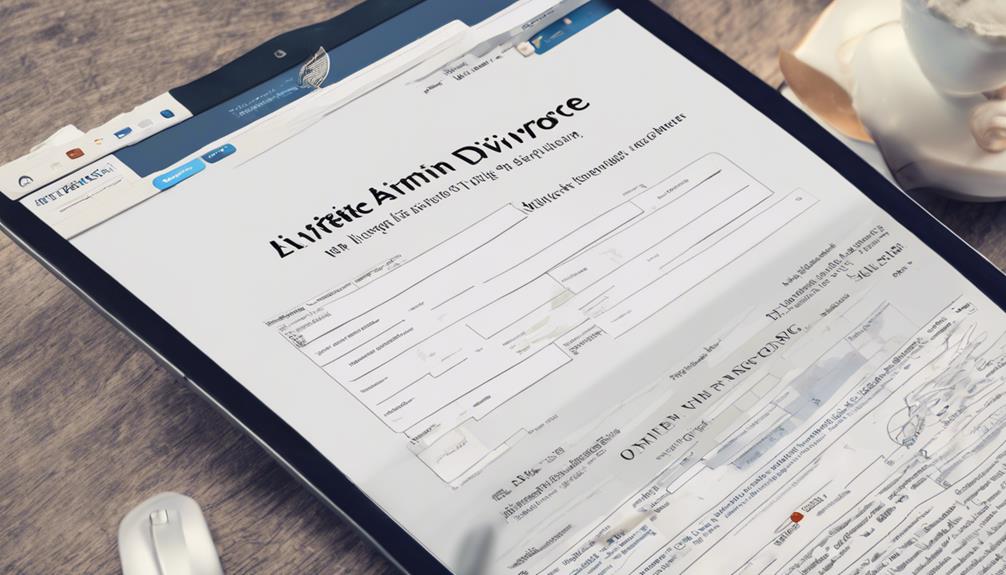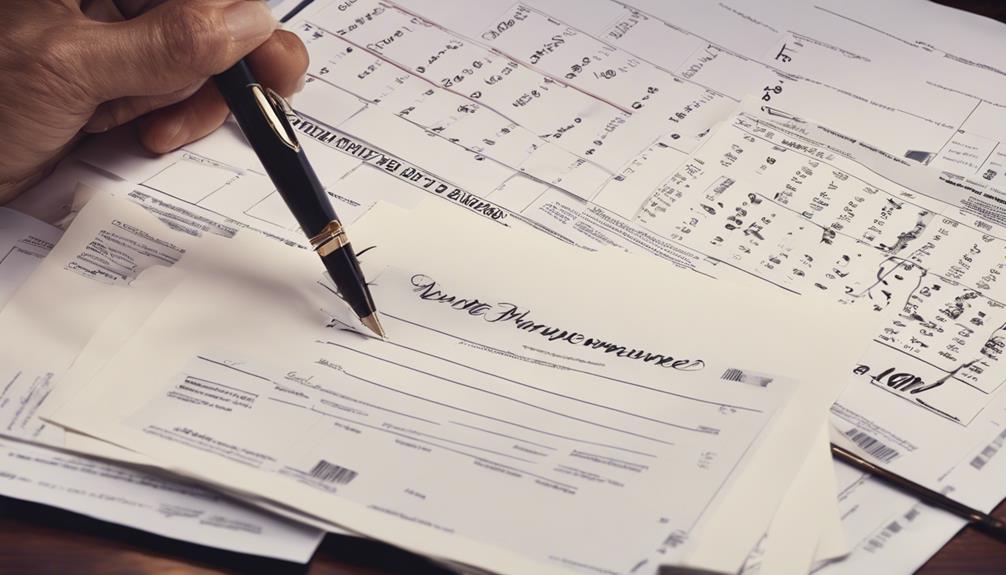Handling an online divorce in Nevada involves satisfying residency requirements and selecting appropriate legal grounds such as incompatibility or living apart. Various types of divorce, including uncontested options, require specific paperwork like financial disclosures and a parenting plan if children are involved. It is important to serve papers promptly and respond in a timely manner to avoid default judgments. Providing accurate financial disclosures ensures a fair division of property. Professionals can provide personalized guidance, while online services can streamline uncontested divorces. Consider the complexity of the case when choosing the best assistance. Understanding these steps sets a solid foundation for a successful divorce process. For more detailed insights, please refer to the following information.
Key Takeaways
- Understand Nevada's residency requirements for divorce eligibility.
- Complete necessary divorce forms accurately and thoroughly.
- Serve and respond to divorce papers promptly and correctly.
- Provide detailed financial disclosures for fair property division.
- Consider professional help or online services based on case complexity and cooperation level.
Residency and Legal Grounds
Establishing residency in Nevada is essential for filing for divorce, as the state requires a minimum of six weeks of residency. This means that individuals looking to end their marriage must first establish themselves as a Nevada resident before initiating divorce proceedings.
Unlike some states that demand fault-based grounds like adultery, Nevada allows for divorce based on incompatibility, living separately, or severe mental illness. This leniency in the grounds for divorce provides couples with more options and flexibility when seeking to dissolve their marriage.
Additionally, Nevada offers residency leniency, enabling individuals to file for divorce in the state even if both spouses don't reside there. As long as one or both spouses are domiciled in Nevada, they can proceed with the divorce filing process.
Understanding the residency requirement and the various grounds for divorce in Nevada is vital for those seeking to liberate themselves from a marriage that's no longer sustainable.
Types of Divorce Available

To proceed with initiating divorce proceedings in Nevada, understanding the available types of divorce is essential. In Nevada, uncontested divorce is a no-fault option that requires meeting specific separation requirements. This means that the divorce can be granted without proving wrongdoing, focusing instead on conditions such as residency and the duration of the marriage.
If a spouse's location is unknown, specific procedures and alternative service methods are in place to facilitate the divorce process. In uncontested divorces, the court issues a decree that sets out the terms agreed upon by the parties.
It's important to make sure that specific residency requirements are met before filing for different types of divorce in Nevada. By being aware of these options and conditions, individuals can navigate the divorce process more effectively, especially when dealing with unique circumstances like an unknown spouse or specific residency situations.
Necessary Paperwork
The necessary paperwork for an online divorce in Nevada includes forms like the Joint Petition for Divorce, Affidavit of Resident Witness, and Decree of Divorce. Financial disclosures, detailing income, assets, expenses, and debts, are essential components of the paperwork.
Completing a Family Court Cover Sheet and Confidential Information Sheet is pivotal when initiating an online divorce in Nevada. Depending on the presence of children, additional forms like a Parenting Plan or Child Support Guidelines Worksheet may be required.
Proper notarization and signing of all forms are indispensable steps in preparing the necessary paperwork for an online divorce in Nevada. Ensuring accuracy and completeness in these documents is key to moving forward with the divorce process efficiently.
It's important to follow the instructions carefully and provide all the requested information to avoid delays or complications in the proceedings.
Serving and Responding to Papers

When serving divorce papers in Nevada, individuals can choose methods like personal delivery, mail, or publication serving. Responding to these papers necessitates filing an Answer within a specific timeframe to avoid default judgments.
Understanding the process of serving and responding to legal documents is essential for a smooth divorce proceeding in Nevada.
Serving Legal Documents
Serving divorce papers in Nevada involves notifying the spouse about the legal proceedings through various methods such as using a process server, certified mail, or personal delivery.
Responding to divorce papers promptly is important to avoid a default judgment. Understanding the implications of the served documents is essential for taking the right legal action.
Properly serving and responding to divorce papers is a critical step in the divorce process to guarantee all legal requirements are met. Choosing a reliable method of service and promptly responding can help navigate the divorce proceedings smoothly.
It's essential to grasp the significance of these initial steps to protect one's rights and interests throughout the divorce process.
Responding to Court
To respond effectively to court proceedings in a divorce case, individuals must promptly file an Answer addressing the allegations and requests outlined in the complaint. Serving divorce papers can be done through personal service, mail, or publication serving. Options like Waiver of Service exist if the spouse agrees to accept the divorce papers without formal service.
Responding to the divorce papers requires filing an Answer within a specific timeframe to address the allegations and requests in the complaint. Failure to respond may result in a default divorce judgment, where the court proceeds without the non-responsive spouse's input. Understanding the implications of serving and responding to divorce papers promptly is essential for a fair and timely resolution of the divorce process.
Paperwork Delivery Process
The delivery process for paperwork in a divorce case involves ensuring timely and appropriate handling of legal documents. In Nevada, divorce papers can be served through personal delivery, mail, or publication serving methods. Spouses may choose to acknowledge receipt of the divorce complaint using options like Waiver of Service. Responding to divorce papers in Nevada requires filing an Answer within a specified timeframe to avoid a default divorce judgment. Understanding the implications of serving and responding promptly is vital in the divorce process.
| Methods of Serving Divorce Papers | Description |
|---|---|
| Personal Delivery | Handing documents directly to the spouse. |
| Sending papers via postal service. | |
| Publication Serving | Publishing in a local newspaper if the spouse cannot be located. |
Financial Disclosures

Detailed financial disclosures in a Nevada divorce demand thorough information on income, assets, expenses, and debts from both parties. It's crucial for individuals to provide accurate and complete details to the court to guarantee a fair outcome in the divorce proceedings. Failing to disclose financial information can result in penalties or negative consequences during the property division process.
To navigate this step successfully, individuals should:
- Compile all sources of income, including salaries, bonuses, investments, and any other financial resources.
- List all assets such as properties, vehicles, savings accounts, and retirement funds.
- Document all expenses and debts, including mortgages, loans, credit card balances, and monthly bills.
Finalizing the Divorce

After signing the Joint Petition for Divorce, both parties must complete the necessary steps to finalize the divorce in Nevada. The next steps include filing the Joint Petition with the court and paying the required filing fee or requesting a fee waiver if eligible. Making sure accurate financial disclosures are submitted is vital before moving forward.
Subsequently, both parties must attend the divorce hearing together to finalize the process. Following the hearing, a copy of the filed Decree must be sent to the other party. A final step involves filing a Certificate of Mailing with the court to confirm that the other party received a copy of the Decree.
Professional Help Vs. Online Services

When considering assistance for divorce proceedings in Nevada, individuals must weigh the benefits of professional legal help against the convenience of online services.
Professional help can offer personalized guidance tailored to individual circumstances, especially in complex cases involving disputes over child custody, alimony, or asset division.
On the other hand, online services provide a cost-effective and streamlined process, ideal for uncontested divorces where both parties agree on terms and seek a simplified resolution.
- Professional Help: Offers personalized legal advice and guidance for complex cases.
- Online Services: Provide convenience and cost-effectiveness for uncontested divorces.
- Consideration: Evaluate the complexity of the case and level of support needed before choosing between professional help and online services.
Ultimately, the choice between professional assistance and online services for divorce in Nevada depends on the specific needs of the individuals involved and the complexity of their situation.
Frequently Asked Questions
Can You Get a Divorce Online in Nevada?
Yes, in Nevada, individuals can get a divorce online if both parties agree on all terms. This process involves completing forms online, submitting them to the court, and awaiting approval. It's a cost-effective and streamlined option.
What Is the Fastest Way to Get a Divorce in Nevada?
For those seeking the quickest divorce in Nevada, utilizing online resources and cooperation can expedite the process. Speeding through the steps sensibly, spouses can swiftly sever ties, saving time and money efficiently.
Can You Get a Divorce Without the Other Person Signing in Nevada?
In Nevada, one can obtain a divorce without the other party signing by following legal procedures correctly. If the other person doesn't respond within a specified time after being served, the divorce can proceed without their signature.
How Can I Divorce My Husband Online?
To divorce online, a person can complete forms, pay fees, and submit documents electronically. This allows for a convenient and cost-effective process. Legal advice is still recommended to make sure all requirements are met.
Conclusion
To sum up, maneuvering through the process of online divorce in Nevada can be uncomplicated with the right guidance. By following the steps outlined in this guide, individuals can efficiently work through residency requirements, necessary paperwork, financial disclosures, and finalizing the divorce.
Whether choosing professional help or online services, taking the necessary steps can help simplify the process and guarantee a smoother shift to the next chapter of life.










